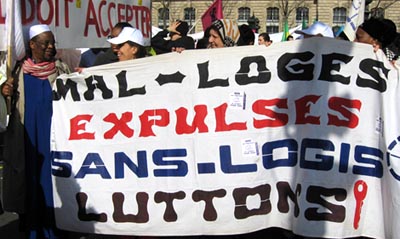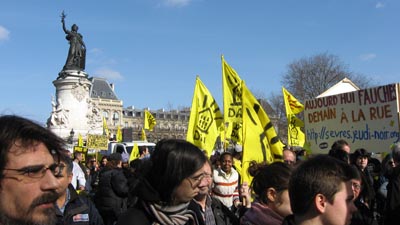Housing rights groups estimate that over two million live in lodgings considered very difficult, meaning without bathrooms, toilets, or heat. Roughly 100,000 people are literally homeless and another 100,000 do not have a fixed address. The Abbé Pierre foundation, a homeless rights group, found that 500,000 households cannot continue to pay their rent. Last year, 28,021 evictions were served according to the Interior Ministry, while the housing rights group Right to Housing puts this figure at 100,000. With the global economic crisis hitting many in France hard, the numbers this year are likely to rise.
"Housing must be a public service," said Danielle Simonnet, President of a Parisian chapter of Parti Gauche, or the Left Party. "It is a fundamental right of man."
The right to housing was historically made into law in France in early 2007 under former conservative president Jaques Chirac. Housing thus was elevated to the same level as healthcare and education. Thrusting the issue into the national spotlight earlier that year were housing rights groups that began pitching red tents along canals in central Paris to highlight the plight of the mal-logés. At the time, the presidential election of April 2007 was in full swing and France’s current President, Nicolas Sarkozy, then the interior minister and presidential candidate for the right-wing Union for a Popular Movement (UMP), vowed that no homeless person would be sleeping outside within two years of his taking office.
Attempting to hold the government to its promises, on March 15th of this year, around 5,000 gathered in central Paris to protest against evictions and to demand that the government do more to help the ‘mal-logés.
 "Though the government gave 360 million euros to banks without a thought, it drastically lowered aid for housing," said Ian Brossat, President of the Group of Communist and Left Party officials in the Paris City Council. "In a crisis, that is the opposite of what they should do."
"Though the government gave 360 million euros to banks without a thought, it drastically lowered aid for housing," said Ian Brossat, President of the Group of Communist and Left Party officials in the Paris City Council. "In a crisis, that is the opposite of what they should do."
The various political parties and housing rights groups that joined the march called for a number of concrete demands. Topping the list was the demand that the government halt all expulsions, accelerate the construction of social housing, and buy vacant buildings and renovate them into low cost apartments. In addition, some groups called for blanket rent freezes and for the central government to commit 2% of its annual budget to financing social housing. Heavily populated by West and North African immigrants, many chanting traditional West African songs accentuated by pulsing Djembe hand drums, the protest attracted a diverse cross section of the population. Indeed, for many the racial element is inseparable from the housing issue.
"The government is racist," said a participant at the March protest who gave his name as Souleymane. "It’s time to talk about this."
 Though housing minister Christine Boutin said to the daily Metro newspaper that from now on, there are no more people in the streets without a solution for a new house, rights groups and politicians have stepped up their actions.
Though housing minister Christine Boutin said to the daily Metro newspaper that from now on, there are no more people in the streets without a solution for a new house, rights groups and politicians have stepped up their actions.
Benoit Hamon, a rising star in the Socialist Party, stopped by a Parisian squat on April 1st to show his support for the students who have been occupying it since January. In the Republic plaza in early April, the Emmaus Association built a pyramid of mattresses to denounce the evictions of people from their apartments.
Fatima Zeejaou, an activist with the Committee of Lodging Actions (CAL), who herself at one point was a mal-logé living in a motel for four years, attended the March protest to demand that Housing Minister Christine Boutin start building houses for the poor. When asked if she thinks Mrs. Boutin will come through on her promises, she replied, "Maybe she’ll do something."
***
Sammy Loren is an independent filmmaker and journalist. To check out more his projects, visit www.sammyloren.wordpress.com or www.mindfulmediacollective.blogspot.com
